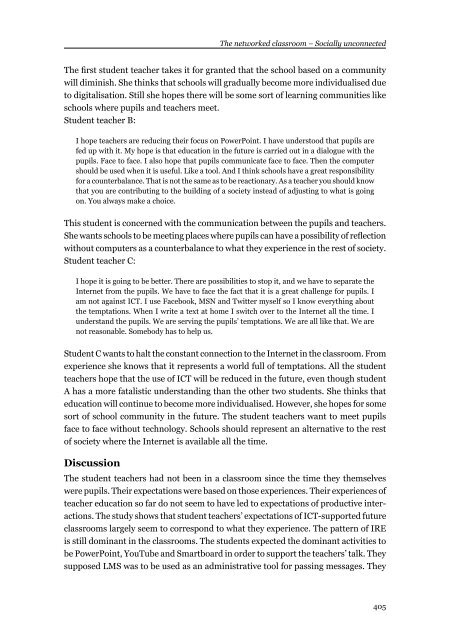Download issue - Umeå universitet
Download issue - Umeå universitet
Download issue - Umeå universitet
You also want an ePaper? Increase the reach of your titles
YUMPU automatically turns print PDFs into web optimized ePapers that Google loves.
The networked classroom – Socially unconnected<br />
The first student teacher takes it for granted that the school based on a community<br />
will diminish. She thinks that schools will gradually become more individualised due<br />
to digitalisation. Still she hopes there will be some sort of learning communities like<br />
schools where pupils and teachers meet.<br />
Student teacher B:<br />
I hope teachers are reducing their focus on PowerPoint. I have understood that pupils are<br />
fed up with it. My hope is that education in the future is carried out in a dialogue with the<br />
pupils. Face to face. I also hope that pupils communicate face to face. Then the computer<br />
should be used when it is useful. Like a tool. And I think schools have a great responsibility<br />
for a counterbalance. That is not the same as to be reactionary. As a teacher you should know<br />
that you are contributing to the building of a society instead of adjusting to what is going<br />
on. You always make a choice.<br />
This student is concerned with the communication between the pupils and teachers.<br />
She wants schools to be meeting places where pupils can have a possibility of reflection<br />
without computers as a counterbalance to what they experience in the rest of society.<br />
Student teacher C:<br />
I hope it is going to be better. There are possibilities to stop it, and we have to separate the<br />
Internet from the pupils. We have to face the fact that it is a great challenge for pupils. I<br />
am not against ICT. I use Facebook, MSN and Twitter myself so I know everything about<br />
the temptations. When I write a text at home I switch over to the Internet all the time. I<br />
understand the pupils. We are serving the pupils’ temptations. We are all like that. We are<br />
not reasonable. Somebody has to help us.<br />
Student C wants to halt the constant connection to the Internet in the classroom. From<br />
experience she knows that it represents a world full of temptations. All the student<br />
teachers hope that the use of ICT will be reduced in the future, even though student<br />
A has a more fatalistic understanding than the other two students. She thinks that<br />
education will continue to become more individualised. However, she hopes for some<br />
sort of school community in the future. The student teachers want to meet pupils<br />
face to face without technology. Schools should represent an alternative to the rest<br />
of society where the Internet is available all the time.<br />
Discussion<br />
The student teachers had not been in a classroom since the time they themselves<br />
were pupils. Their expectations were based on those experiences. Their experiences of<br />
teacher education so far do not seem to have led to expectations of productive interactions.<br />
The study shows that student teachers’ expectations of ICT-supported future<br />
classrooms largely seem to correspond to what they experience. The pattern of IRE<br />
is still dominant in the classrooms. The students expected the dominant activities to<br />
be PowerPoint, YouTube and Smartboard in order to support the teachers’ talk. They<br />
supposed LMS was to be used as an administrative tool for passing messages. They<br />
405

















